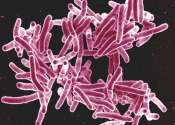Immune system targets vitamin B12 pathway to neutralize bacteria
Close to 1.8 billion people worldwide are infected with Mycobacterium tuberculosis (Mtb), the common and occasionally deadly bacterium that causes millions of cases of tuberculosis each year. The bacteria, having coevolved ...
Oct 31, 2019
0
587









